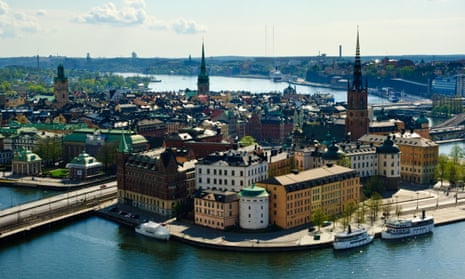When people think of gender equality, they probably don’t immediately think of snow. But the small Swedish city of Karlskoga did just that, when, five years ago, the city reviewed the way it cleared its streets.
Officials realised that clearing the main highways first benefited car drivers, more of whom tended to be men, rather than footpaths and cycle paths, more often used by women.
So the city decided to start by snowploughing the streets and paths around daycare centres, then areas around the largest workplaces and schools, before moving on to office districts and main roads. The result? Gender-neutral snow clearing with fewer injuries, since pedestrians are more likely than motorists to be injured in icy weather.
That’s just one example of what can happen when officials consider the impact of everyday policies on women.
Sweden is the leader in this regard, and not just when it comes to snow-clearing. The country has a feminist foreign policy, and each year its budget is analysed by the Swedish Women’s Lobby to see how resources are divided – and whether the government is living up to its promises on gender equality.
A recent OECD report – The Pursuit of Gender Equality: An Uphill Battle – outlines the size of the problem. Young women in OECD countries often now have more years in education than young men, with 34% of women in higher education, compared to 30% of men. But women are still, despite a narrowing employment gender gap, less likely than men to have a job – 74% of men in OECD countries have a job, compared to 62.8% of women.
Gender pay gaps widen with age, as having a family usually has a negative impact on women’s earnings and career prospects. While the gender gap between childless men and women is 4.8%, that gap widens to 22.6% between men and women with at least one child. In the UK, the gender pay gap between men and women is still at 18.1%. Women are also less likely to be entrepreneurs, and are underrepresented in private and public leadership positions.
The OECD wants gender to be central to policy-making – or, at the very least, it wants countries to think about how policies will impact men and women differently. It’s done a roundup of countries that are trying to do this.
In Canada, each federal department is responsible for incorporating the government’s commitment to gender equality within its work. Progress is measured through a process called gender-based analysis plus. In Mexico, the government has made it mandatory for all planning, fiscal and budgeting legislation to consider gender. Mexico also systematically tags budget allocations for gender equality and makes this information available to the public. Allocations are tracked as they are approved, modified and spent and this information is presented in quarterly reports and annual public accounts.
It’s something the UK has still to learn. Here, we are seeing the impact of what happens when gender is not taken into account. Since 2010, the UK government’s austerity policies, including welfare cuts, have impacted massively on women. According to research by the House of Commons library, 86% of funding cuts have come out of women’s pockets as a result of tax and benefit changes, such as a cap on housing benefit. That means the cuts since 2010 will have cost women a total of £79bn, compared to £13bn for men.
And Carolina Magdalene Maier, a Danish MP from the Alternative party, says that too often, even in Denmark, ranked 14th on the World Economic Forum’s gender parity list (the UK is 15th), gender awareness is just an afterthought in the policy-making process.
Speaking at the Women Political Leaders conference in Reykjavik last week, Maier said that Denmark had tried for over a decade to put gender issues at the heart of policies. But still there is no dedicated ministry for gender equality – the minister responsible also looks after fishing and Nordic co-operation. “It shows the lack of significance put on gender equality,” said Maier.

